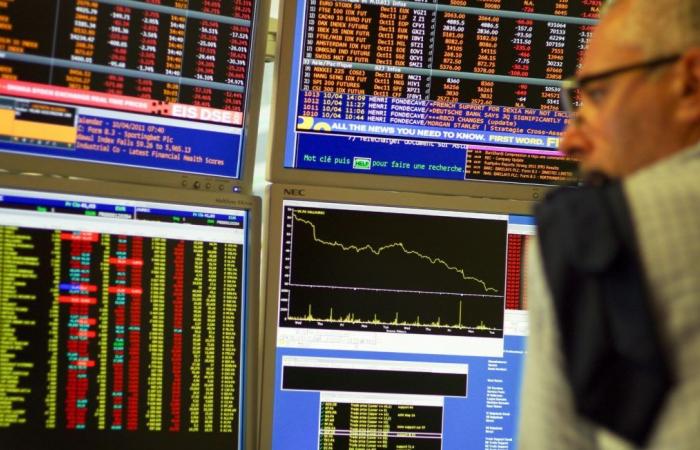
The probability of an absolute majority in the National Assembly for the National Rally seems to be fading for European stock markets, which were up on Monday after the first round of the legislative elections in France. The CAC40 was up 1.6% at the end of the morning after jumping 2.8% in early trading.
On the foreign exchange market, the single European currency gained 0.33% against the greenback, at 1.0748 dollars for one euro, driven by the scenario “according to which the National Rally could not obtain an absolute majority in the second round”, comments Ipek Ozkardeskaya, analyst at Swissquote Bank.
“Least worst scenario”
“The risk of a radical change in policy in France has diminished and the sigh of relief on the stock markets is clearly felt,” comments Jochen Stanzl, market analyst at CMC Markets.
The presidential camp came in third place on Sunday with 20.04% of the vote, behind the New Popular Front (27.99%) and the National Rally, which was well ahead with 33.14% of the vote. For the markets, this was the victory of the “least worst scenario” that took place on Sunday, comments John Plassard, investment specialist for Mirabaud.
“This gives the RN party a relative, but not absolute, majority, which would require at least 289 of the 577 seats in the national chamber,” comments Samy Chaar, chief economist of Lombard Odier.
There remains “great uncertainty”
“However, the results of the first round pose a great deal of uncertainty as to the final composition of the National Assembly,” due to a very high number of three-way races, “making it very difficult to predict the result,” he continued. Candidates still in the running have until Tuesday 6 p.m. to decide whether or not to continue.
If the RN were to nevertheless obtain an absolute majority, which cannot be ruled out, “the key question would be how they would choose to govern,” explains Samy Chaar. “Would they adopt a confrontational approach and break with the European Union on issues such as the budget, or a more conciliatory approach, similar to the far-right government in Italy led by Giorgia Meloni, thus approaching the political center on many issues?”, the economist explains.
Several values on the rise
Among the other “reassuring” indicators to be taken into account this Monday, the gap between the interest rate on France’s ten-year bond and that of Germany, the benchmark in Europe, is narrowing after reaching a peak since 2012 the previous week. This gap, called the “spread”, is an indicator that measures investor confidence in a country, here, France.
French stocks, which suffered from political instability after the announcement of the dissolution of the National Assembly on June 9, are over-represented in the main increases in the pan-European Stoxx 600 index. French banks rebounded significantly: Société Générale took 5.06%, Crédit Agricole 4.12% and BNP Paribas 3.85%.
Other companies battered since the dissolution due to concerns about nationalization or stricter supervision of certain activities were also on the rise: Vinci took 3.32%, Eiffage 3.94%, TF1 6.52% and Engie 3.49%.





